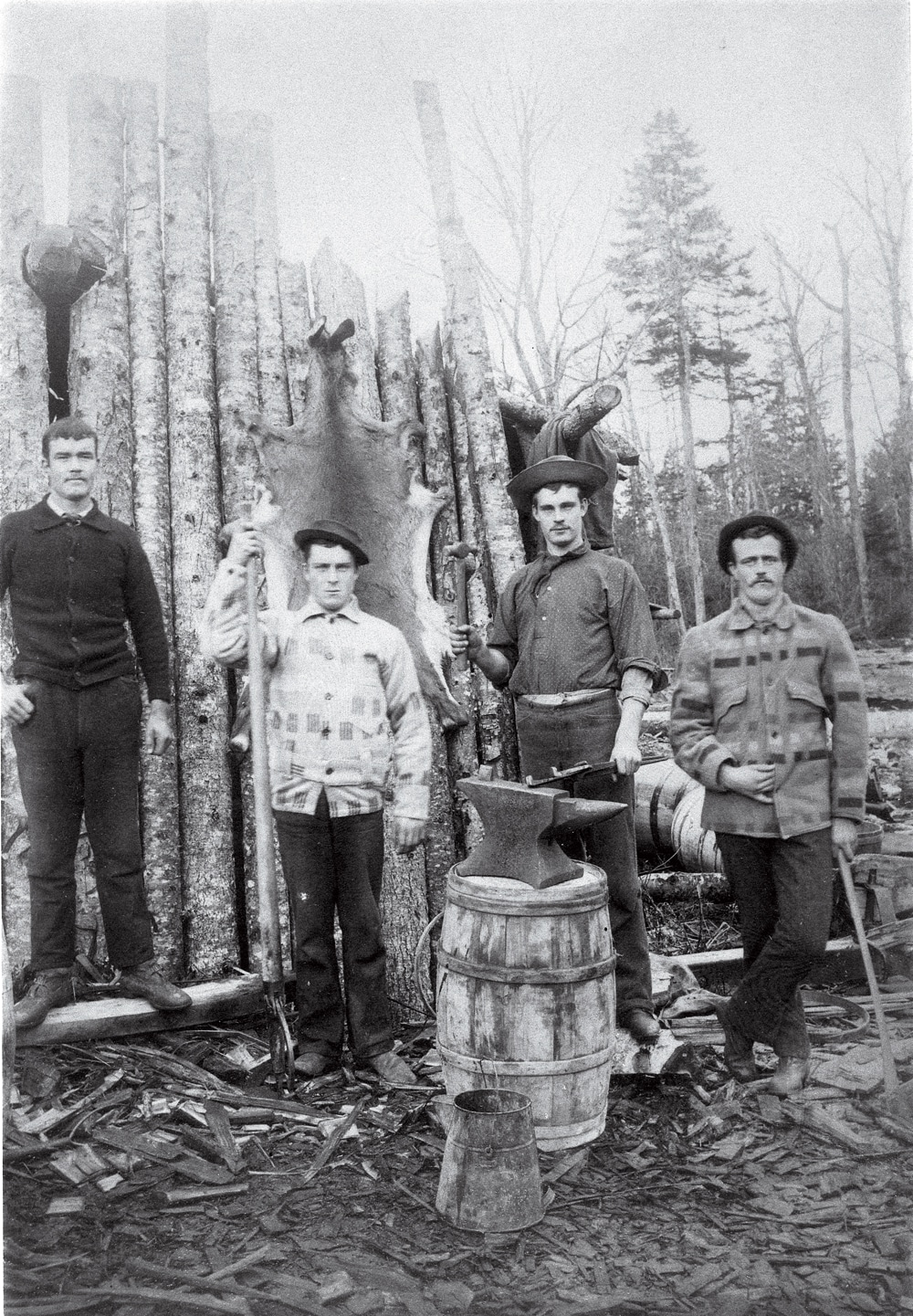Into the Woods | Local Treasure
The Patten Lumbermen’s Museum takes visitors into the rugged and essential lives of those who felled the trees that helped build a nation.

With a barrel serving as a rough base for his anvil, a blacksmith sets up shop at a logging camp in the Maine woods c. 1900.
Photo Credit : Courtesy of Patten Lumbermen’s MuseumTo the men who logged the Maine woods in the early 20th century, the Lombard steam log hauler was a game changer. Invented in Waterville, Maine, and resembling a cross between a tractor and a train engine, the machine represented the lumber industry’s first significant leap into the internal-combustion age. Yes, its lack of brakes made it dangerous, and its two wood-fired engines needed constant attention, but it also freed lumbermen from relying on teams of horses to haul sleds of logs out of the woods in winter. Records of the time show that during one two-month stretch in 1907, a Lombard moved more than 3 million log feet, a workload that previously required 62 horses.

Photo Credit : Courtesy of Patten Lumbermen’s Museum
Only 83 of these machines were ever manufactured, and today just six survive. One of these is part of the collection at the Patten Lumbermen’s Museum in Patten, Maine, about 90 miles north of Bangor. In 1982 the American Society of Mechanical Engineers named this particular Lombard a National Historic Mechanical Engineering Landmark.
The story of the Lombard steam log hauler is part of a larger tale told here—one of a way of life that goes back more than 400 years, when early settlers felled the pine that dominated Maine’s virgin forests. From this land came the wood that built a new nation’s homes and ships. When the wood-pulp paper industry took root in the late 19th century, generations of Mainers were employed to feed the big mills that sprouted up around the state.
Lore Rogers, a research scientist and son of a lumberman, and Caleb Scribner, an artist and game warden, opened the museum in 1963. What they created isn’t a mere collection of artifacts but rather a tour through time. Over here is a replica of a sparse, dirt-floored 1820 camp; over there is its more accommodating 20th-century counter-part, complete with bunkhouse and dining quarters. The early saws give way to their gasoline-powered successors, and harnesses and haying tools yield to internal-combustion engines.
Given that it’s set in the heart of the very landscape that inspired it, the museum has grown as almost a community endeavor. Summer bean-hole suppers draw hundreds of attendees, and many items on display have been donated by families who made the woods their way of life. Beyond the eight-foot chainsaws, the Model T bobsled, and the massive wagon wheels, there are personal artifacts such as the spruce gum boxes that the men decorated or scribbled poetry onto in the darkened hours before bed. Visitors can put their hands on a small tobacco tin or feel the worn leather of a pair of heavy work boots. The simultaneous narratives of life and livelihood are blended together seamlessly here, making for a museum in which you can spend a quick hour or an entire afternoon.
Only about 2,000 visitors a year pass through the front door of the Patten Lumbermen’s Museum. But given that it’s located near the northern entry point of one of the country’s newest natural attractions, the 87,500-acre Katahdin Woods and Waters National Monument, that number is sure to change. After all, anyone who is traveling this far north is likely pulled by some of the very same things—remoteness, an unending sense of grandeur—that called out to those who once worked the woods, or who still do.
“I love it when the old loggers come in—it brings back all these memories for them,” says Rhonda Brophy, the museum’s curator and director. “It was a unique life they had. It was hard and sometimes cruel, but there was a lot of camaraderie in the work. A lot of accomplishments.”
61 Shin Pond Road, Patten, ME. 207-528-2650; lumbermensmuseum.org
Ian Aldrich
Ian Aldrich is the Senior Features Editor at Yankee magazine, where he has worked for more for nearly two decades. As the magazine’s staff feature writer, he writes stories that delve deep into issues facing communities throughout New England. In 2019 he received gold in the reporting category at the annual City-Regional Magazine conference for his story on New England’s opioid crisis. Ian’s work has been recognized by both the Best American Sports and Best American Travel Writing anthologies. He lives with his family in Dublin, New Hampshire.
More by Ian Aldrich

